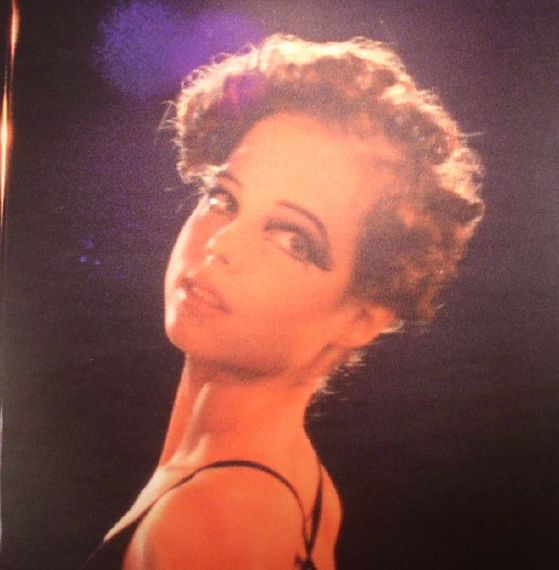Delia Gonzalez's debut titled In Remembrance is released on April 28, 2015 through DFA Records. This is not an average record release. This record has taken several years and is part of a larger multimedia project. In Remembrance was conceived between 2010-2012. It also functions as the soundtrack to two gorgeous 16mm ballet films made by Delia for a 2010 exhibition in Naples, Italy. The completed films were also exhibited in 2012 as part of another exhibit in Koln.
Fortunately for the listener, the record comes with a DVD of the films as well as a disc of remixes by her collaborator Bryce Hackford. Hackford's remixes recontextualize the hypnotic quality of In Remembrance and bring it to unlikely places. It's a complete package, which gives you a sense of the broad scale this project was born into.
Last Sunday, Delia performed pieces from In Remembrance along with collaborators Bryce Hackford, Alice Cohen, Adrian Knight and David Lackner at MoMA PS1 in celebration of the record's release. It was a visually stunning show.
The crowd was sitting under a dome while the films played above the band. The band were all playing synths and doing variations on some of the songs on In Remembrance. The men wore suit jackets and the women wore dresses. The band was bathed in a red light which complimented the film's mostly red and orange tones. It was an immersive experience.
Delia's previous records with Gavin Russom as Delia and Gavin and as Black Leotard Front are also available on DFA. This is her first solo record.
I sat down in Delia's kitchen towards the end of March to discuss the record and I did manage to get her to tell me the truth a few times over this discussion. If you know Delia, it is not an easy feat to get her to talk about herself at length.
--------------------------------------------------------------------------------
Interview conducted on 3.25.15
DG: I'm really self-conscious when people are recording me.
MN: Don't be self-conscious.
DG: You're going to memorize everything because you have such a great memory.
MN: Do you have a bowl we can smoke pot out of?
DG: Huh? No.
MN: Do you have a rolling paper?
DG: Mm-hmm
MN: Get me a rolling paper. That would be cool.
DG:I can't smoke pot; I won't be able to talk.
MN: So why a solo record? Why now?
DG: You know what? I have a feeling this isn't going to work Mike.
MN: Why?
DG: I'm really horrible about talking about myself.
MN: Just let it rip, we're gonna edit out anything that sucks.
DG: OK, that's cool.
MN: Let's talk candidly, we always talk candidly.
DG: I know. We do talk candidly.
MN: I should tell the recorder that Delia and I are good friends. So we know each other. So we have some history and have had long discussions about all this stuff. So this shouldn't be any different.
DG: Right.
MN: So the best parts, we will just put out into the world. The parts that suck we won't. I'll give you editorial control. Deal? Shake on it.
DG: Deal. (shakes hands) OK.
MN: Why is the record titled In Remembrance?
DG: It's taken from a text by Henry Miller.
MN: Which piece?
DG: It's from a letter he wrote to Anias Nin.
MN: are you going to include the text in any of the materials
DG: I kinda felt like I should and then decided there was no point. I didn't want to explain my artwork or why I do what I do.
MN: So this interview we are doing, you're not going to explain much.
DG: Right, it's all too personal.
--------------------------------------------------------------------------------
MN: Would you say that memory is merely myth building? I know from working in documentary I realized that when I interview someone they will tell me a story and it will be way different than the same memory the other guy tells me.
DG: Everyone is different and will have their own interpretation.
MN: Why do you think that is? Do you think people make their memories self-serving because we want to remember things a certain way to make the memories more palatable to us?
DG: I don't think it's intentional. People tend to interpret their life experiences differently according to how they are reacting to life in that moment or what they are creating for themselves at the moment.
MN: Do you think if you asked someone a question now and then asked the question in ten years, that the answer will be the same?
DG: Oh my god, not me. I think every minute I can answer a question differently.
MN: Your piece has ballet dancers. The record comes with a DVD. How important is that video to the music? Do you have a lighter for this joint?
DG: If I smoke that joint I won't be able to talk. Only think.
MN: What's the difference?
DG: Between thinking and talking? You don't read minds and I do.
MN: Do you wanna conduct the rest of this interview by reading my mind? You can answer the questions you anticipate I will say? That could be interesting.
DG: That's cool let's do that.
MN: There's an element to this conversation that is performance, right?
DG: Everything is performance. Except people are usually unaware that it's a performance.
MN: The In Remembrance video is a video you had shown in a gallery. Is this true?
DG: Mm-hmm
MN: Tell me about the gallery exhibit and performance.
DG: The performance?
MN: Yeah- the girls, the ballet? How did it come about?
DG:I had written this song, and originally... I may have to start lying now.
MN: Please do.
DG: I'm not a very good liar.
MN: I think you are the best liar because you have never told the truth before.
------------------------------------------------------------------------------
MN: The music on In Remembrance has elements to me of 1960's style serial composition which is very cerebral to people, but I don't think it is for you. I think it's emotionally based. I think you feel in serial composition rather than someone like John Cage who will tend to intellectualize it. Is that correct?
DG: I think you're right. I work intuitively. I work on music in two ways. One of the ways is a song will play in my head one or two years before I jot it down.
MN: So you have a long-term focus on a melody.
DG: Yeah, exactly. Every once in awhile I will sit down to write something if I'm incredibly inspired. For the most part the song will just play in my head.
MN: How formed are the songs in your head?
DG: Fully formed.. At some point I will write a quick melody. I don't know. Something for two minutes. Then after that the whole song gets written in my head. Sometimes that gets a little bit complicated.
MN: It takes you a long time to write a record. I can't see you banging another one out right now. Right?
DG: Everything takes me a long time.
MN: So melodies will need to build up in your head over a long time. Over the next say two to three years.
DG: Exactly. Except there are periods when I do write songs daily.
MN: when did you shoot the video?
DG: Between 2010 and 2012.
MN: Wow, so this has been gestating for a while. So released in 2015, that's a 5-year process.
DG: Well, DFA wanted to release it two years ago, but then the timing wasn't right for them. They feel like now is the right time.
MN: How connected is the video to the audio portion of this project?
DG: I felt like the music was very tightly tied to the dance performance. Basically it started with my writing this one song, then all of the sudden I read this Henry Miller piece and after I read the Henry Miller piece, I thought, oh this has to turn into a ballet film. It had to be a dance piece because there were all these emotions and ideas I wanted to put into words, but I couldn't. I felt like the only thing that could carry these emotions and these thoughts was dance.
MN: Well, they are very obscured. A person could do a dance that makes you feel the way you wanted it to feel, but an outside set of eyes can't tell if its an autobiographical piece about this, this and that. Dance is a way of abstracting emotions.
DG: I feel like dance is a way of communicating things that you can't communicate through words.
MN: Much in the way body language does.
DG: Well, our vocabulary is very limited. If you knew every language in the world there would probably be enough words to express most emotions and feelings. I feel like dance does a good job of expressing these things you can't express by talking. And the same thing with music.
MN: which is the same thing with body language. So little is actually said with words.
DG: Are you good at reading body language?
MN: As good as anyone is.
DG: What's my body language telling you now?
MN: That this interview is over.


